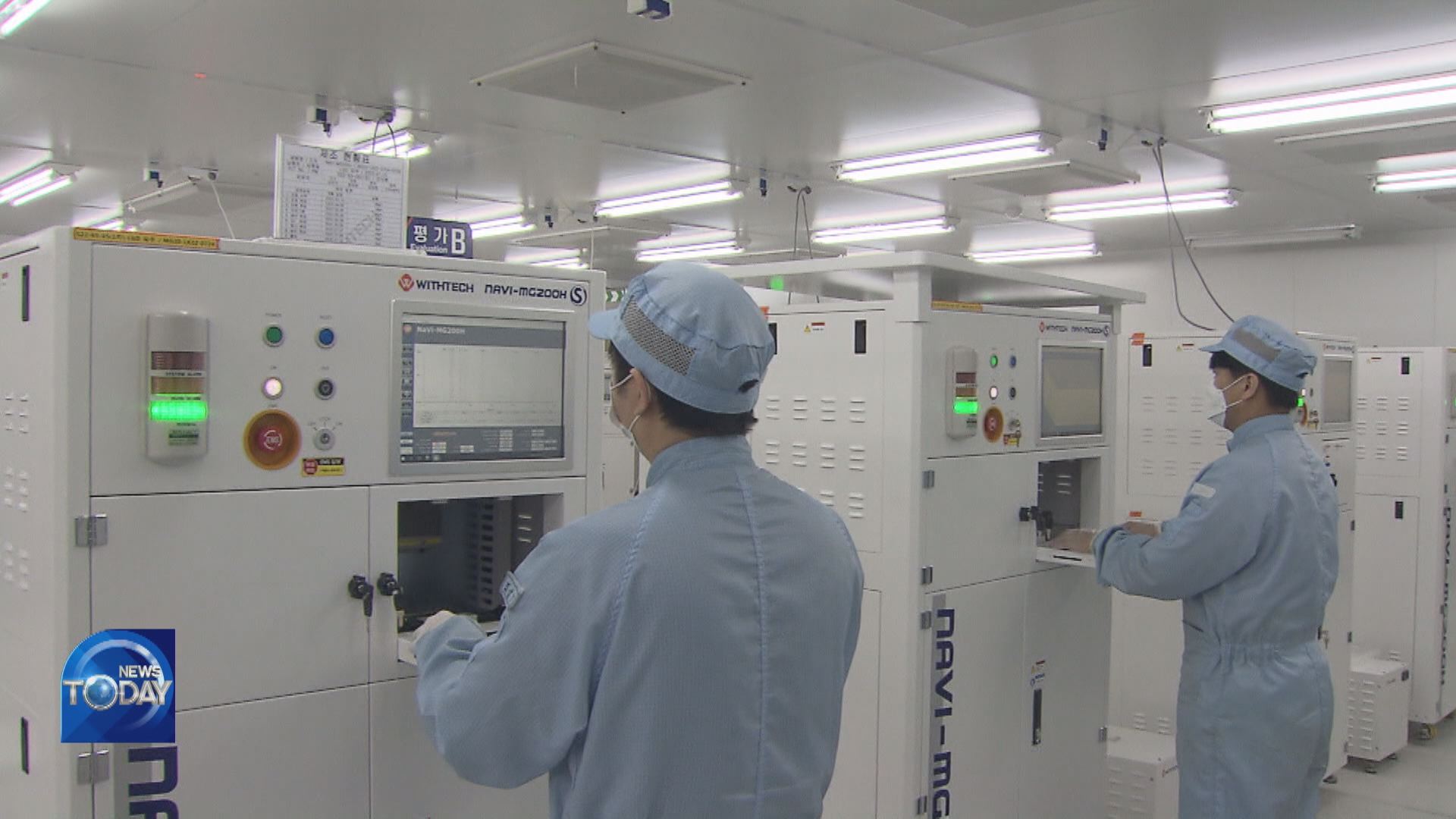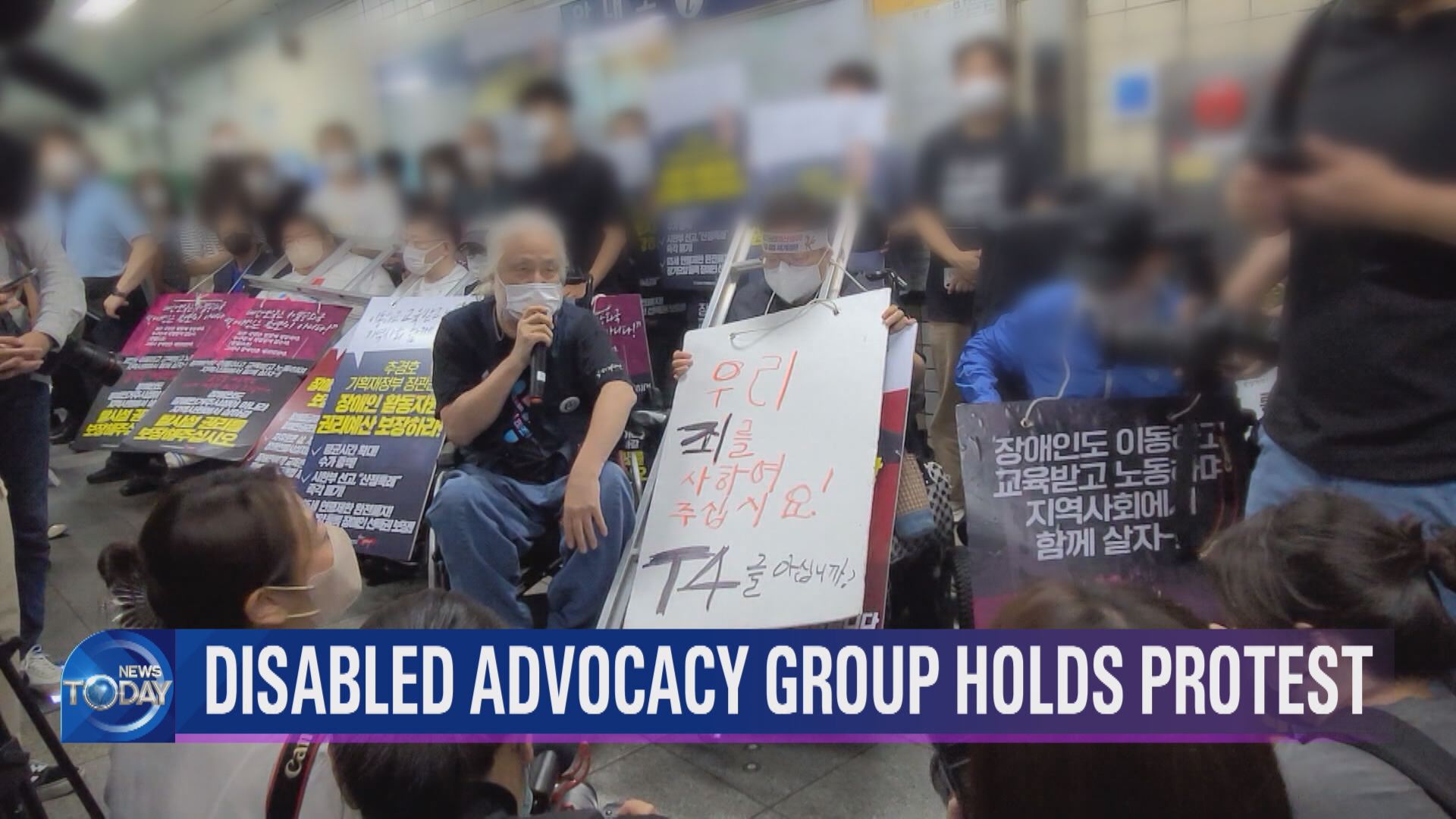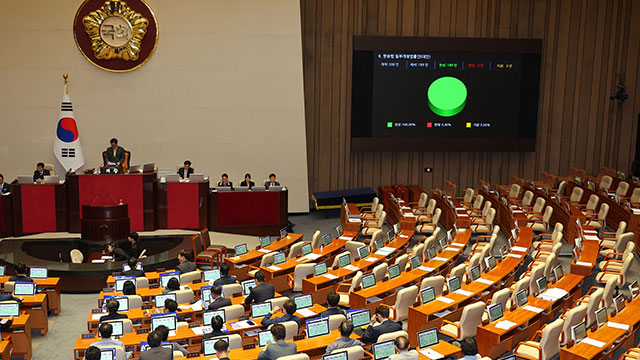SHORTAGE OF SEMICONDUCTOR WORKERS
입력 2022.06.20 (15:26)
수정 2022.06.20 (16:45)
읽어주기 기능은 크롬기반의
브라우저에서만 사용하실 수 있습니다.
[Anchor Lead]
After the president pointed out the shortage of semiconductor experts, the relevant ministries have set up a task force to devise measures. The Education Ministry is considering overhauling regulations to increase admissions at semiconductor-related college departments. But the academic sector says it's not a fundamental solution.
[Pkg]
This company produces devices for measuring and controlling airborne molecular contamination during semiconductor manufacturing. The firm has been growing steadily, but it has been understaffed for ten years now, because finding the right personnel is not easy. Last month it posted a hiring ad, but couldn't even fill half of its vacant positions.
[Soundbite] Kwak Byung-moon(WITHTECH) : "We never had enough new recruits. People think small firms don't pay enough and working there is too hard."
Every year the semiconductor sector needs more than 3,000 workers. About 90 percent of SMEs with fewer than 300 employees experience labor shortages. They say colleges need to admit more semiconductor-majors to meet labor demand at SMEs.
[Soundbite] Park Jae-geun(Korean Society of Semiconductor & Display Technology) : "Conglomerates are not the only ones that need workers. Firms producing semiconductor materials, components and equipment also need them. The most fundamental solution is increasing semiconductor majors at colleges."
The Education Ministry is reviewing the option of increasing the number of students majoring in semiconductors, starting with colleges based in the capital region. The ministry says any regulations hampering the process should be abolished. However, the academic sector states it's not a feasible solution due to the lack of professors and funding.
[Soundbite] Prof. Hwang Cheol-seong(Seoul Nat‘l Univ. (June 15)) : "We don't have enough professors to teach students. You can't solve this problem just by admitting more students."
The academic sector believes using existing students who already major in similar areas would be more efficient.
[Soundbite] Prof. Hwang Woo-hyeon(Dongyang Mirae Univ.) : "It would be better to reorganize the existing departments with the focus on semiconductors in order to train professionals needed by businesses."
The task force for nurturing semiconductor experts, which comprises officials from seven ministries, will devise and announce measures next month.
After the president pointed out the shortage of semiconductor experts, the relevant ministries have set up a task force to devise measures. The Education Ministry is considering overhauling regulations to increase admissions at semiconductor-related college departments. But the academic sector says it's not a fundamental solution.
[Pkg]
This company produces devices for measuring and controlling airborne molecular contamination during semiconductor manufacturing. The firm has been growing steadily, but it has been understaffed for ten years now, because finding the right personnel is not easy. Last month it posted a hiring ad, but couldn't even fill half of its vacant positions.
[Soundbite] Kwak Byung-moon(WITHTECH) : "We never had enough new recruits. People think small firms don't pay enough and working there is too hard."
Every year the semiconductor sector needs more than 3,000 workers. About 90 percent of SMEs with fewer than 300 employees experience labor shortages. They say colleges need to admit more semiconductor-majors to meet labor demand at SMEs.
[Soundbite] Park Jae-geun(Korean Society of Semiconductor & Display Technology) : "Conglomerates are not the only ones that need workers. Firms producing semiconductor materials, components and equipment also need them. The most fundamental solution is increasing semiconductor majors at colleges."
The Education Ministry is reviewing the option of increasing the number of students majoring in semiconductors, starting with colleges based in the capital region. The ministry says any regulations hampering the process should be abolished. However, the academic sector states it's not a feasible solution due to the lack of professors and funding.
[Soundbite] Prof. Hwang Cheol-seong(Seoul Nat‘l Univ. (June 15)) : "We don't have enough professors to teach students. You can't solve this problem just by admitting more students."
The academic sector believes using existing students who already major in similar areas would be more efficient.
[Soundbite] Prof. Hwang Woo-hyeon(Dongyang Mirae Univ.) : "It would be better to reorganize the existing departments with the focus on semiconductors in order to train professionals needed by businesses."
The task force for nurturing semiconductor experts, which comprises officials from seven ministries, will devise and announce measures next month.
■ 제보하기
▷ 카카오톡 : 'KBS제보' 검색, 채널 추가
▷ 전화 : 02-781-1234, 4444
▷ 이메일 : kbs1234@kbs.co.kr
▷ 유튜브, 네이버, 카카오에서도 KBS뉴스를 구독해주세요!
- SHORTAGE OF SEMICONDUCTOR WORKERS
-
- 입력 2022-06-20 15:26:13
- 수정2022-06-20 16:45:59

[Anchor Lead]
After the president pointed out the shortage of semiconductor experts, the relevant ministries have set up a task force to devise measures. The Education Ministry is considering overhauling regulations to increase admissions at semiconductor-related college departments. But the academic sector says it's not a fundamental solution.
[Pkg]
This company produces devices for measuring and controlling airborne molecular contamination during semiconductor manufacturing. The firm has been growing steadily, but it has been understaffed for ten years now, because finding the right personnel is not easy. Last month it posted a hiring ad, but couldn't even fill half of its vacant positions.
[Soundbite] Kwak Byung-moon(WITHTECH) : "We never had enough new recruits. People think small firms don't pay enough and working there is too hard."
Every year the semiconductor sector needs more than 3,000 workers. About 90 percent of SMEs with fewer than 300 employees experience labor shortages. They say colleges need to admit more semiconductor-majors to meet labor demand at SMEs.
[Soundbite] Park Jae-geun(Korean Society of Semiconductor & Display Technology) : "Conglomerates are not the only ones that need workers. Firms producing semiconductor materials, components and equipment also need them. The most fundamental solution is increasing semiconductor majors at colleges."
The Education Ministry is reviewing the option of increasing the number of students majoring in semiconductors, starting with colleges based in the capital region. The ministry says any regulations hampering the process should be abolished. However, the academic sector states it's not a feasible solution due to the lack of professors and funding.
[Soundbite] Prof. Hwang Cheol-seong(Seoul Nat‘l Univ. (June 15)) : "We don't have enough professors to teach students. You can't solve this problem just by admitting more students."
The academic sector believes using existing students who already major in similar areas would be more efficient.
[Soundbite] Prof. Hwang Woo-hyeon(Dongyang Mirae Univ.) : "It would be better to reorganize the existing departments with the focus on semiconductors in order to train professionals needed by businesses."
The task force for nurturing semiconductor experts, which comprises officials from seven ministries, will devise and announce measures next month.
After the president pointed out the shortage of semiconductor experts, the relevant ministries have set up a task force to devise measures. The Education Ministry is considering overhauling regulations to increase admissions at semiconductor-related college departments. But the academic sector says it's not a fundamental solution.
[Pkg]
This company produces devices for measuring and controlling airborne molecular contamination during semiconductor manufacturing. The firm has been growing steadily, but it has been understaffed for ten years now, because finding the right personnel is not easy. Last month it posted a hiring ad, but couldn't even fill half of its vacant positions.
[Soundbite] Kwak Byung-moon(WITHTECH) : "We never had enough new recruits. People think small firms don't pay enough and working there is too hard."
Every year the semiconductor sector needs more than 3,000 workers. About 90 percent of SMEs with fewer than 300 employees experience labor shortages. They say colleges need to admit more semiconductor-majors to meet labor demand at SMEs.
[Soundbite] Park Jae-geun(Korean Society of Semiconductor & Display Technology) : "Conglomerates are not the only ones that need workers. Firms producing semiconductor materials, components and equipment also need them. The most fundamental solution is increasing semiconductor majors at colleges."
The Education Ministry is reviewing the option of increasing the number of students majoring in semiconductors, starting with colleges based in the capital region. The ministry says any regulations hampering the process should be abolished. However, the academic sector states it's not a feasible solution due to the lack of professors and funding.
[Soundbite] Prof. Hwang Cheol-seong(Seoul Nat‘l Univ. (June 15)) : "We don't have enough professors to teach students. You can't solve this problem just by admitting more students."
The academic sector believes using existing students who already major in similar areas would be more efficient.
[Soundbite] Prof. Hwang Woo-hyeon(Dongyang Mirae Univ.) : "It would be better to reorganize the existing departments with the focus on semiconductors in order to train professionals needed by businesses."
The task force for nurturing semiconductor experts, which comprises officials from seven ministries, will devise and announce measures next month.
이 기사가 좋으셨다면
-
좋아요
0
-
응원해요
0
-
후속 원해요
0
















![[단독] ‘뇌물 혐의’ 업체 싹쓸이, 비밀은 ‘구매요구서’?](/data/layer/904/2024/07/20240727_cQg3uy.jpg)

이 기사에 대한 의견을 남겨주세요.